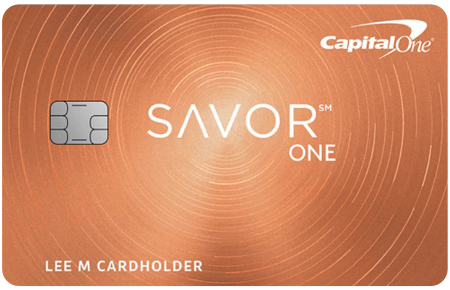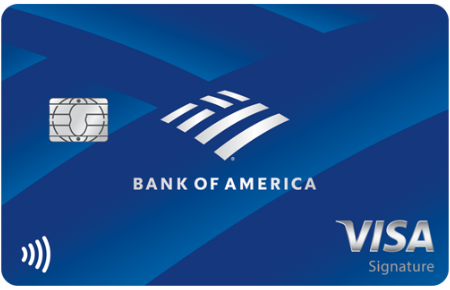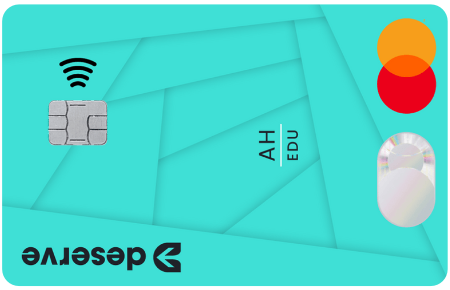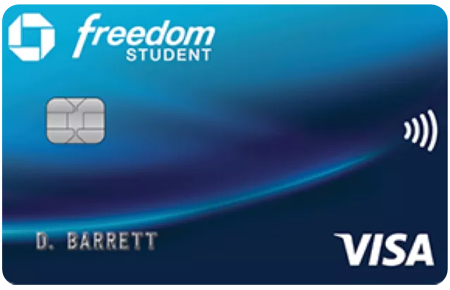The Best Student Credit Cards of 2026
Whether you are preparing to enter your first year of college or are already nearing your graduation date, you have probably thought about getting a credit card.
Our team of experts gathered the ultimate list of credit cards that suit a variety of people, regardless of your credit score and history. If you are ready to find the most beneficial credit card for your situation, keep reading this article to learn everything you need to know.
The Best Student Credit Cards
Many students build credit during their time at school by taking out student loans. However, student loans can put a lot of pressure on you to pay down thousands of dollars in student loan debt once you graduate. For this reason, many people turn to student credit cards to build credit and have an additional way to make everyday purchases.
However, you should never just jump into applying for credit cards without doing your research first. If you are a student and have never had a credit card before, you probably have a lot of questions right out of the gate. For example, what exactly is a student credit card? What are some good methods for finding the best credit card for college students? Finally, what are the best student credit cards in 2026?
In today’s guide, we will answer all of these questions and more, but first, let’s take a look at exactly what the term “student credit card” really means.
What Is a Student Credit Card?
While a student credit card is not an official type of credit card developed by banks and lenders, it does refer to a general type of credit card for beginners. Essentially, a student credit card is an entry credit card for young people who want to build a positive credit history, gain experience using a credit card, and have an additional way to pay for everyday purchases as they arise.
In short, it is a credit card that is tailor-made for students and others who may have little or no experience with credit cards.
Since most students applying for their first credit card have no credit score, banking institutions and lenders will typically make the cards less desirable. More specifically, they will likely have the following qualities:
High APR
The APR of your credit card refers to the Annual Percentage Rate that you will pay on outstanding balances. While many loans have the option to get a fixed interest rate, almost all credit cards come with variable interest rates. This means that the amount you pay in interest can increase or decrease based on economic factors outside of your control, like the Federal Interest Rate. In any case, starting APRs for student credit cards tend to be higher (currently between 22% – 26%).
So, let’s say you get a student card with a 22% APR. This means that you will have to pay interest on any amount that is left on your credit card after your monthly payment date at a rate of 22% per year. For example, let’s say that you use your credit card and spend $300. Your minimum payment is $25. You make the minimum payment, leaving you with a balance of $275.
Once the next payment cycle has started, interest will be added to this amount. Interest is calculated daily, but you can get a rough estimate of what you will owe by taking the remaining balance, multiplying it by 1.22 (22%), and then dividing that number by 12.
You divide by 12 because interest is totaled up every month and added to your balance. In the example above, you could expect to have approximately $27.95 added to your balance. Therefore, it is better to pay down your credit cards in full every month to avoid paying interest.
Low Credit Limit
Since college students often do not have an income or may only have a part-time income, they present a greater risk to lenders. For this reason, student credit cards typically come with a low credit limit. The credit limit refers to the maximum amount you can put on your card at any given time.
A starter credit card could have a limit anywhere from $100 to $1,000. In any case, you want to avoid maintaining a balance that is more than 30% of your credit limit, as this can have a negative impact on your credit score.
As you build your credit, you can often call your bank or the credit card lending institution to request a credit line increase. Sometimes, lenders will automatically increase your limit if you have shown a streak of good financial behaviors. However, if you have a big purchase that you want to make on your card, lenders will often increase your limit to allow you to make it.
Minimal Rewards
Most credit card issuers and lenders use reward systems to get more people to apply for their credit cards. These can vary from cash reward credit cards (with benefits depending on the type of purchases you make) to travel rewards points you can use for your next vacation.
However, the rewards for student credit cards are typically lower or, in some cases, even non-existent. This is because student credit cards are almost exclusively used to build a credit history, and students do not need as much enticement to sign up.
That said, you may still get a rewards credit card as a student. It all depends on the lender and whether or not you have an existing credit score. However, don’t expect great cash-back deals or student rewards programs that will give you great benefits. Even if you do get a student credit card with a reward system, you always need to remember that these systems are designed to encourage you to spend more. So, don’t go chasing after rewards benefits if it makes you spend outside your budget.
Fees
Most credit card providers have ditched annual fees because they are simply not popular with consumers. However, when you are limited in the cards you qualify for, you may run into more fees. Annual fees can range anywhere from $25 to $250. So, if you do get a card with an annual fee, you will need to factor this into your budget.
Fortunately, there are still many student credit cards out there with $0 in annual fees. Some of these cards require you to spend a certain amount per year to avoid fees, while others charge no fees at all (regardless of how you use the card). In any case, it is always important to read the fine print to know exactly what, if any, fees to expect.
Annual fees are not the only fees college credit card owners need to worry about. If you plan on traveling, foreign transaction fees can quickly add up (unless you have a credit card that offers zero foreign transaction fees). In addition to foreign transaction fees, most credit cards have fees if you go over your credit limit, make a late payment, or otherwise fail to meet the terms and conditions of your credit card account.
Why Building Credit Is Important For a College Student
Thus far, we have assumed that you want to build your credit as a college student. But why? What good does it do you to have a good credit score by the time you have graduated? The truth is, there are various reasons to begin building your credit as soon as possible. This is because it takes years to build (and rebuild) your credit.
Let’s use a comparison to show the importance of building credit as a student. Student A gets a credit card for students during their freshman year of college. They only use it occasionally and always pay down their balance. After four years of good habits, they can leave college with a good credit score. Consequently, if they want to get a mortgage to buy a home, an auto loan, or even a better credit card, they will have a much better chance of getting good rates and terms.
Student B didn’t see the need to get a credit card as a student, so they waited until after graduating from a four-year college to get one. They have just started building their credit, giving them virtually no credibility with lenders. Unless they can get a parent to cosign a loan, they will likely not qualify for a mortgage, and if they do, the terms will not be in their favor.
In this situation, student A spent 4 years building their credit and preparing themselves for adulthood, while student B waited too long to start building their credit.
Building Good Financial Habits as a College Student
It is also important to note that student cards are not just about building your credit score or getting a higher credit line. It is also about learning financial responsibility. College student credit cards introduce many younger adults to concepts like credit, debt-to-asset ratios, minimum payments, APR, and so on. By learning these lessons early on, students can function as more financially-responsible adults once they leave school and enter the workforce.
“Financial habits and norms are the values, standards, routine practices, and rules to live by that people rely on to navigate their day-to-day financial lives. They support the ability to effectively manage money and respond quickly to financial decisions or challenges.” – Consumer Financial Protection Bureau
While you can still build good credit habits without a credit card, it is easier to understand how different behaviors can impact your overall finances with regular credit card use. Besides keeping track of your balance, you have to make sure that minimum payments are always made on time. Additionally, you can see how larger market forces can affect your personal finances, from the Fed raising the interest rate to lenders offering lower credit limits during recessions.
Methods For Selecting the Best Credit Cards For Students
If you’re a student with a bank account and a mailing address, you have probably already started receiving credit card offers in the mail. It is important to note that the “deals” you see in the mail are generally not that good. You can often find far better credit cards through your existing bank or online. Try to avoid getting sucked in by credit cards mailed right to your house, as they usually have the highest APRs and most limiting terms of service.
So, what methods can you use to select the best credit card for students? Here are a few ways to make sure you’re getting the best student credit card during your search:
Shop around – The most important tip when shopping for a student card is to evaluate your options. Don’t just go with the first decent credit card you can find. Shop around at different banks and lending institutions to see what’s out there.
Read the fine print – Always read the fine print before signing on the dotted line. Some credit card issuers sneak in clauses that could end up costing you hundreds or even thousands of dollars per year. So, even if the terms of use seem a little boring, make sure you read and understand everything before you apply!
Look for low APRs – As previously mentioned, finding a student credit card with a low APR is hard. However, this doesn’t mean you have to settle for the highest possible interest rate. You can search for student cards with more competitive APRs, and credit cards that offer a one-year 0% introductory rate.
Think about your needs – You might be tempted to get a student card with a high limit, but do you really need it? Sometimes, having more capacity to spend will only encourage you to spend money you don’t have. So, think about what you really need in a card before picking one.
Make sure you qualify – Without a credit score, you will not qualify for many credit cards. So, don’t waste time shopping around for credit cards that require a high credit score. Instead, look for cards more in line with your current credit (we will go over some of the best options below!)
Don’t open too many new accounts at once – You might think that getting multiple credit cards will help you build your credit faster, but it could put you in a short-term slump. Generally, the length of your credit history is a major factor in your credit report, so opening new accounts can actually hurt your score at first. Moreover, you may find it harder to juggle multiple card payments if you are new to credit cards. So, start with just one credit card and, if necessary, apply for a new one later on.
Can Students Prequalify For a Credit Card?
Yes, students can prequalify for a credit card. In fact, unless you have a terrible credit score due to poor financial behaviors, you can likely qualify for dozens of different cards. The vast majority of college student credit cards are designed for people with low or no credit scores. As a result, it is easy to prequalify with little more than a name and address!
5 Best Student Credit Cards of 2026
Now that you know a little more about student credit cards, including the advantages and disadvantages of acquiring one, let’s take a look at the 5 best student credit cards of 2026:
Discover it® Student Cash Back
The Discover it Student Cash Back credit card offers cash rewards without needing a credit score to apply. That said, a credit score of at least 580 is recommended to ensure you qualify. In any case, Discover’s student credit card makes it easier to get a starter card with reasonable interest rates.
- Annual Fee: $0
- Intro APR: 14.49% – 23.49% (Variable)
- Recommended Credit Score: 580 – 740
- Rewards: 5% cash back on Paypal purchases and 1% cash back on all purchases
- Additional Benefits: No credit score needed to apply
- Best For: Students with no credit score
Capital One® Quicksilver Student Cash Rewards
The Capital One Quicksilver Student Cash Rewards credit card stands out for its cash rewards, including a bonus of $100 if you spend the same amount within the first three months. While the Quicksilver card does not offer the lowest APRs, it also does not have strict requirements for credit scores, making it an easy option for most students. Plus, like all of the cards on this list, you don’t have to worry about annual fees!
- Annual Fee: $0
- Intro APR: 16.49% – 26.49% (Variable)
- Recommended Credit Score: 580 – 740
- Rewards: 1.5% cash back on all purchases, 5% on qualifying hotels and rental cars
- Additional Benefits: Earn an extra $100 if you spend $100 within the first 3 months
- Best For: Students who plan to use their card regularly
Bank of America® Travel Rewards Card For Students
The Bank of America Travel Rewards Card For Students is specifically designed for students who plan to travel. Rather than getting direct cash rewards, each dollar you spend with the BoA Travel Rewards card earns you points that can go toward past or future travel purchases. This is one of the best credit cards for college students who are studying abroad or plan to travel during school or after graduation.
- Annual Fee: $0
- Intro APR: 14.24% to 24.24% (Variable)
- Recommended Credit Score: 580 – 740
- Rewards: 1.5x travel reward points per $1 spent
- Additional Benefits: No international transaction fees
- Best For: International, study abroad, or foreign exchange students
Deserve® EDU Mastercard For Students
The Deserve EDU Mastercard For Students does not require any credit score to apply and qualify. With a reasonable variable APR, no annual fees, and 1% cash back on all purchases, it is hard to argue against the Deserve EDU Mastercard for college students who need to develop a credit history.
- Annual Fee: $0
- Intro APR: 20.99% (Variable)
- Recommended Credit Score: N/A
- Rewards: 1% cash back on all purchases
- Additional Benefits: No credit score required
- Best For: Students without credit scores
Chase Freedom® Student Credit Card
The Chase Freedom Student Credit Card offers some of the lowest intro APRs on the market. Additionally, it offers cash back deals on all purchases and an automatic increase in your credit limit after five months (as long as you make your monthly payments on time). However, to qualify for the Chase Freedom student credit card, you must have an existing credit history. Consequently, this card is best for students who want to improve their credit score, as opposed to students who are starting from scratch.
- Annual Fee: $0
- Intro APR: 17.24% (Variable)
- Recommended Credit Score: 670 – 850
- Rewards: $50 intro bonus, 1% cash back on all purchases
- Additional Benefits: Automatic credit limit increase after the first 5 monthly payments
- Best For: Students with existing credit scores
Alternatives to Student Credit Cards
All the cards listed above can provide students with the tools they need to build credit and better understand their financial habits. But what if you don’t want a traditional credit card? If you want to build your credit without getting a student credit card, you still have a few options:
Personal Loan – Even if you don’t have credit, you may be able to take out a personal loan with the help of a co-signer. Some lenders will even lend out small loans that are designed to be repaid in a short amount of time. This way, you can build your credit without paying a fortune in interest.
Credit-Builder Loan – A credit-builder loan is specifically designed for people with no credit or low credit scores. You can apply for credit-building loans through banks or other lending institutions. However, keep in mind that missing a payment could end up doing more harm than good, so it is vital that you pay back any kind of loan promptly.
Secured Credit Card – Secured credit cards have lower approval requirements than traditional credit cards, but they require you to put forward a cash advance at the start. For example, putting $500 toward a secured credit card would earn you $500 of credit. In this way, a secured credit card functions more like a debit card while allowing you to build up your credit.
Auto Loan – If you are in need of a car, an auto loan is a great way to kill two birds with one stone. You can take out a loan to pay for the car and build your credit as you pay back the loan. However, you should not take out an auto loan unless you actually need to buy a car. Taking out an auto loan just to create a credit history for yourself could potentially put you in a tough financial position.
Make Payments On Time – Even if you don’t take out a loan or a credit card, you can still build financial credit by making recurring payments on time. These might include rent, utilities, cable, or internet bills. While not all of these payments will be reported to credit bureaus, making all of your required payments on time increases the chances of boosting your credit score.
The Bottom Line – Build a Credit History With Confidence
As you can see, student credit cards offer you a great way to build your credit while you get an education. The key is to practice good financial habits and keep a close eye on your debts. With credit cards, it is easy to spend money now and not think about the consequences until it is too late. So, make sure to pay off all of your debts as soon as possible.
Fortunately, if you use your college student credit cards correctly, you can build your credit score over time and qualify for better deals along the way. Additionally, by applying for one of the best student credit cards of 2026, you increase the chances of taking advantage of no fees, lower APRs, and additional benefits for students!
Frequently Asked Questions About The Best Student Credit Cards
Yes, you can get approved for a credit card as a student. In fact, you can even prequalify for certain credit cards, though the terms and conditions may not be ideal. So, even if you don’t have any credit built up yet, you can still qualify for credit cards while you’re in college.
If you are a student with no income, you may need a parent or guardian to cosign the credit card application. This essentially means that the other person will take financial responsibility if you cannot repay your debts. Alternatively, you can apply using income that you have access to (allowance, legal guardian income, etc.), even if it is not earned through your own employment.
Building credit at an early age is a good idea. That said, young credit card holders need to understand the potential consequences of owning a credit card. Ideally, parents, legal guardians, or another responsible party should have access to the account so that they can monitor an 18-year-old’s spending habits.
No, it is not hard to get a credit card as a student. While you will likely not qualify for as many credit cards as an older, working adult, you can still qualify for plenty of “starter” cards when you are a student. A typical student card has a high APR and low credit limit. So, while it may be a little harder to get a credit card as a student (especially if you don’t have an income), it is still relatively easy to get a basic credit card and start building your credit history.
Yes, student credit cards (including secured credit cards) do build credit. As long as you use your credit card wisely, make your payments on time, and avoid maintaining a high balance on your card, you will see your credit score go up with time. Many students get impatient when they check their free credit score and it has not changed, but you have to remember that building credit is a long game. As long as you practice good habits over the years, you will see your credit score rise!
What type of Student Credit Card suits your situation best?
Compare the best credit cards in the overview above.




